Choosing Floor Finishes
CHOOSING FLOOR FINISHES: A HOW-TO GUIDE
The floors in your home or office probably take the biggest beating of any surface in the building: foot traffic, moving furniture, not to mention messes and spills. That’s why it’s important to choose a floor finish that suits the lifespan of your needs, and can handle the foot traffic of the particular space. In this article we will walk you through the different options available on the market, and the pros and cons of each.
CERAMIC AND PORCELAIN TILING
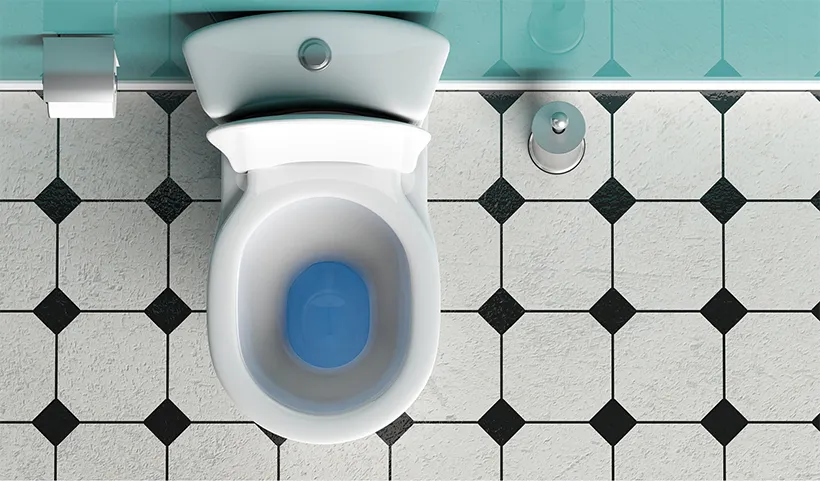

Tiles are one of the most popular options for floor spaces in bathrooms and kitchens, but are also widely used on countertops, walls and patios. Available in various finishes and styles including glazed and unglazed, porcelain, ceramic and more, tiles are easy to clean and relatively simple to maintain. Unglazed ceramic tiles lend an artistic, rustic finish but are less durable and less resistant to spills and staining.
PROS
- If you’re on a tight budget, glazed ceramic tiles offer good value for money.
- Tile floors tend to be more durable because they are moisture resistant and can
- generally handle high amounts of foot traffic.
- High temperature and chemical resistance.
- Easy to clean and maintain.
- Comes in a wide variety of designs and finishes
CONS
- Requires regular cleaning.
- Grout can gather mildew build up quickly in more humid spaces.
IMPORTANT: There is a distinct difference between floor and wall tiles. Never use wall tiles
for flooring - speak to one of our in-store specialists for advice on your purchase decision.
NATURAL STONE


Earth-sourced materials such as marble, slate and granite offer a sturdy and stylish, albeit pricier option for flooring. Because of the inherent natural element of the material, unique patterns, streaks and colours are guaranteed, making them a perfectly stylish option for floors with heavy foot traffic.
However, each natural stone has its own characteristics and levels of durability. For example, marble, also being one of the more costly options, is susceptible to scratches and stains and requires a lot of upkeep to keep it looking spotless.
PROS
- Ideal for warm climates and works well with both indoor and outdoor spaces.
- Aesthetic appeal.
- Durable with regular maintenance.
CONS
- It is usually a more costly option, from installation to maintenance.
- Installation requires expertise.
- Requires regular maintenance.
WOOD
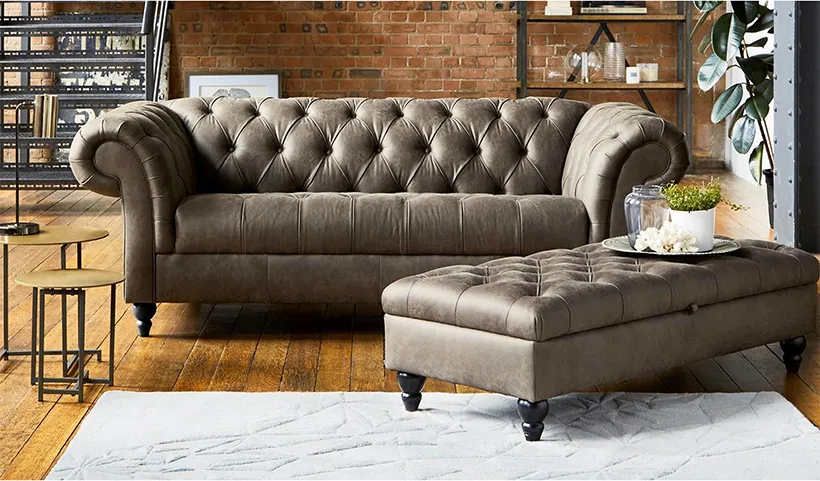

Wood flooring adds a sense of warmth and luxury and tends to also increase the value of your property. Hardwood floors are available in solid planks or smaller pieces such as parquet flooring, while engineered wood is comprised of top-tier plywood with a hardwood surface veneer. Both have distinct properties which should be considered, for example, hardwood is more expensive and more susceptible to scratching than engineered wood. Another benefit of engineered wood flooring is that it is usually be treated for UV-resistance
PROS
- Maintained properly, it has great for durability and gives your space an instantly comforting feel.
- Most wood flooring will be sourced from sustainable sources.
- Aesthetic appeal.
CONS
- Certain wood varieties can be costly and hard to come by.
- Solid hardwood floors can be susceptible to common wood defects such as crowning and cupping, especially if installed incorrectly.
- It is more susceptible to damp and natural pests.
BAMBOO
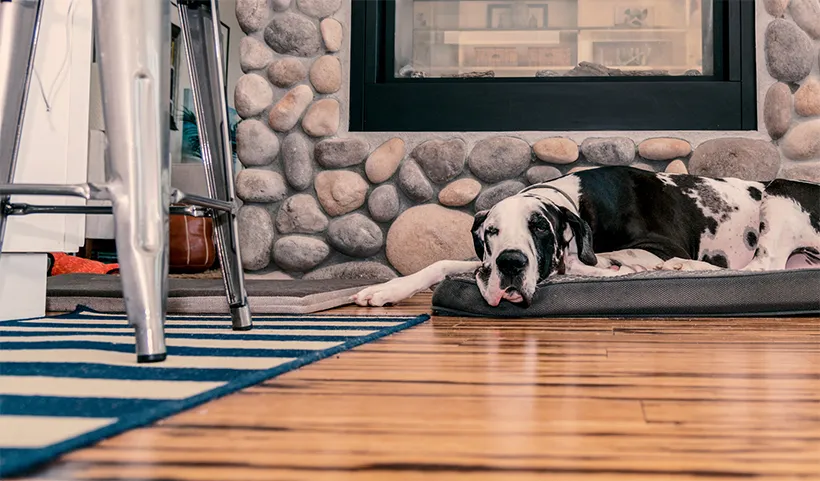

Bamboo floors can be an eco-friendlier and more affordable alternative to wood floors, this tough, quick regenerating grass is a hardy substitute. It’s available in similar finishes to most wood panelling.
PROS
- It can be long-lasting if treated well.
- Easy to install.
- If sourced from sustainable sources, it is more eco-friendly.
- More resistant to water damage than wood flooring.
- Aesthetic appeal.
CONS
- It is limited in tonal shades.
- Can be prone to scratches and dents if top of the range materials isn’t used.
CARPETS
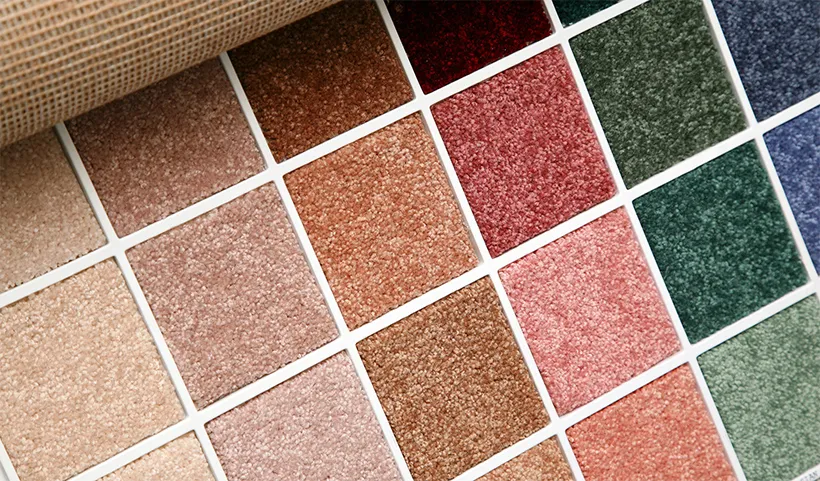

For a warmer, more affordable textile covering, most homeowners still turn to carpeting. Available in various materials ranging from stain-resistant nylon to sturdy polyester to natural wool, there are also various weaving techniques to strengthen this type of flooring for heavy floor traffic, such as loop pile carpeting.
PROS
- Provides for a warmer, more comfortable space with sound-absorbing qualities.
- Carpeting tends to be cheaper than wood and ceramic floor options.
- Comes in a vast array of materials, design and style options.
CONS
- Can be tough to keep clean or maintain in a busy household.
- It can aggravate certain allergies by trapping dust or pollen.
- More likely to retain stains and odours.
LAMINATE
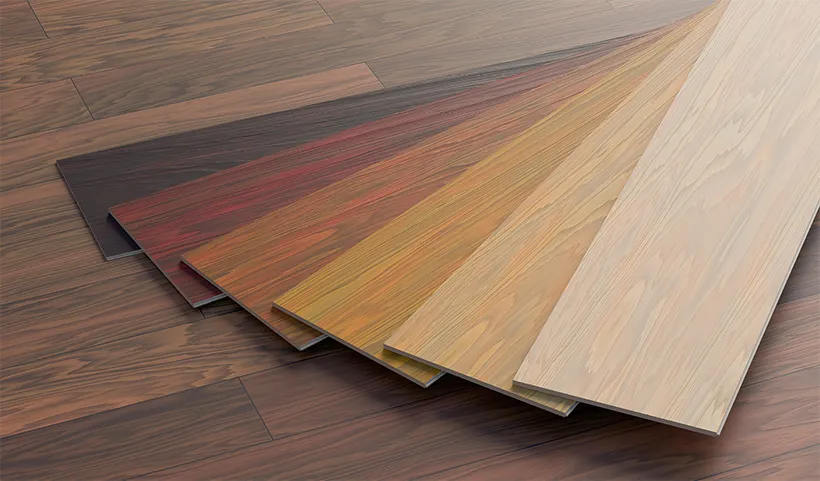

This has been a popular option in many homes and kitchens for years, providing a wide range of finishes at an affordable price. It is comprised of a fibreboard and melamine resin core and a photographic appliqué with a clear coat. Often resembling hardwood finishes, it also comes in different designs.
PROS
- Easy to clean and maintain.
- Available in a wide range of styles.
- Relatively easy to install.
- Cheaper than solid wood floors.
CONS
- It provides little acoustic cushioning, meaning the room might be prone to echoing.
LINOLEUM
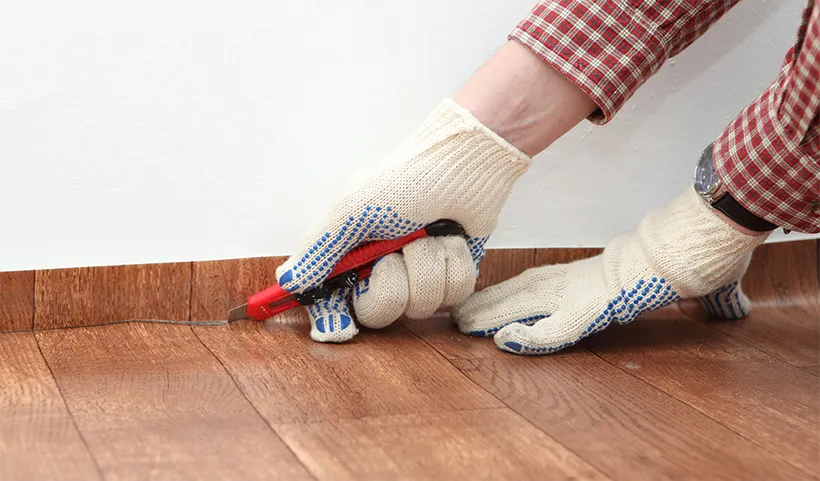

This compound material is made from natural elements, including linseed oil. It is a popular feature in spaces that need easy-to-clean floor applications, and is perfectly fitted for indoor use. It is one of the more affordable and cost effective flooring options on the market.
PROS
- It is a biodegradable material and is composed from renewable materials, contributing to a greener home.
- It’s available in a huge variety of colours and styles.
- It’s durable, requires little maintenance and is easy to clean.
- It’s one of the most affordable floor coverings available.
CONS
- It may fade or turn yellow with long exposure to sunlight.
- Can be scratched or dented by heavy furniture.
- If you’re planning to resell, it won’t add to the realty value of your home.
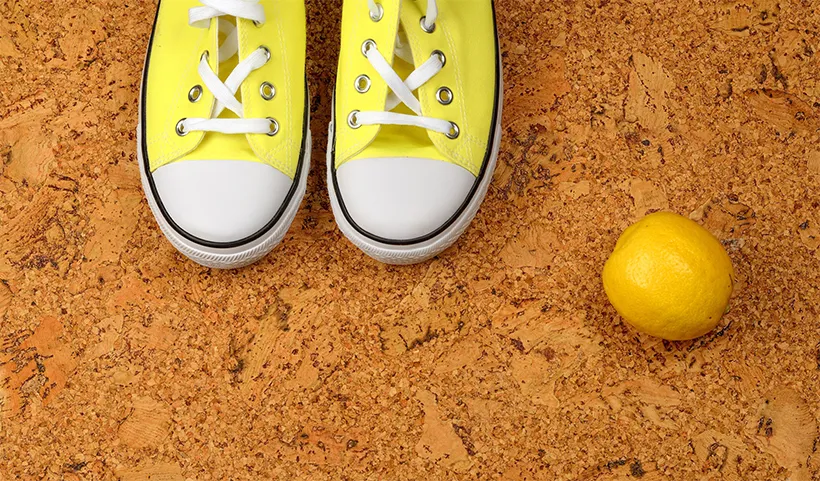

Available in tile format, this green-building option is perfect for indoor spaces that require a stylish but affordable option with low to medium foot traffic.
PROS
- It is a durable option that also contributes towards dampening sound in the room.
- It is inherently antimicrobial, hypoallergenic.
- It is entirely recyclable.
CONS
- Cork tiles are prone to temperature changes and may warp, expand or crack due to moisture levels.
- Heavy furniture may leave permanent indents.
- Requires regular maintenance to keep it in good condition.
- Less suitable for areas with heavy foot traffic.
- Direct sunlight may cause the cork to fade.
CONCRETE
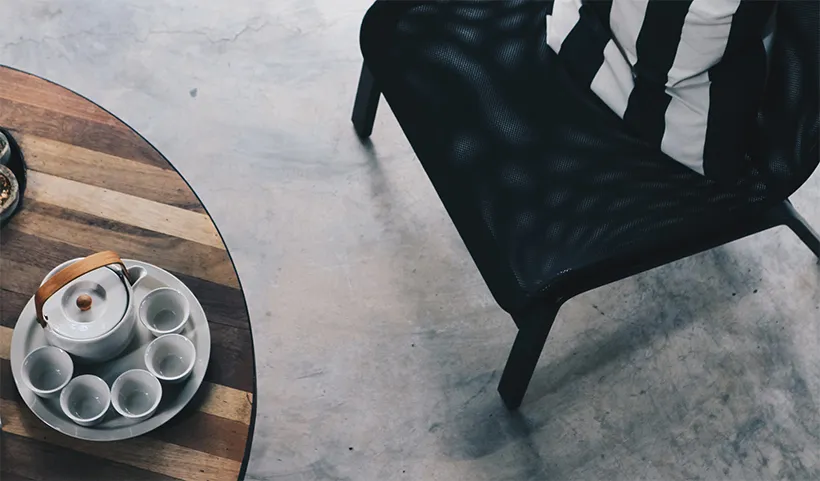

More and more modern spaces are doing away with floor coverings, choosing to finish off with a smooth concrete or cement surface instead. For a floor space that has heavy foot traffic and requires easy cleaning, this option is best. Since polished concrete floors became more popular, there has been a vast increase in the variety of colour and texture effects on offer. Some warmth can easily be added with a few scattered accent rugs, should it be required.
PROS
- It is a highly durable option with a long life-span.
- Easy to clean and maintain.
- Basic concrete finishes are very cost effective.
- Properly sealed it offers good chemical and water resistance.
CONS
- Hairline cracks may be visible through time.
- Doesn’t retain warmth in the room.
- No acoustic absorption.
- If not properly sealed and insulated it will be susceptibility to moisture.
EPOXY
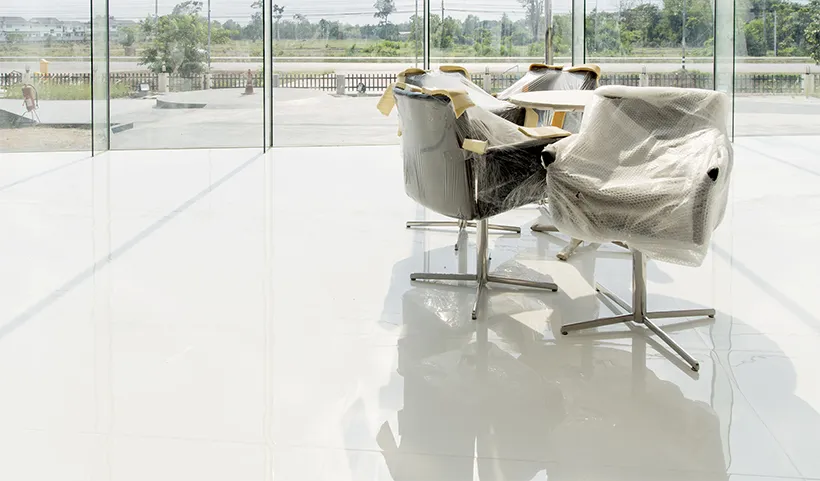

This mix of resins and hardeners combine and react chemically to form a rigid plastic surface that is durable. It offers a sturdy stylish option that is perfect for both home and office use and in areas where durability is important due to heavy floor traffic. Suitable for a number of applications and available in various types, such as self-levelling epoxy, epoxy mortar, quartz-filled epoxy, anti-static or epoxy flake floors.
PROS
- It not only protects the underlying concrete floor from moisture or cracks, it is also easy to install.
- It is one of the more affordable flooring options.
- Offers good chemical, water and heat resistance.
- Resistant to bacteria and germs.
- With regular maintenance it can be very long lasting and durable.
- Available in a variety of colours.
CONS
- The application has a heavy chemical odour and there is a danger of fume inhalation during or shortly after installation.
- Arduous preparation and installation.
- Installation should best be performed by a professional.
PVC/VINYL
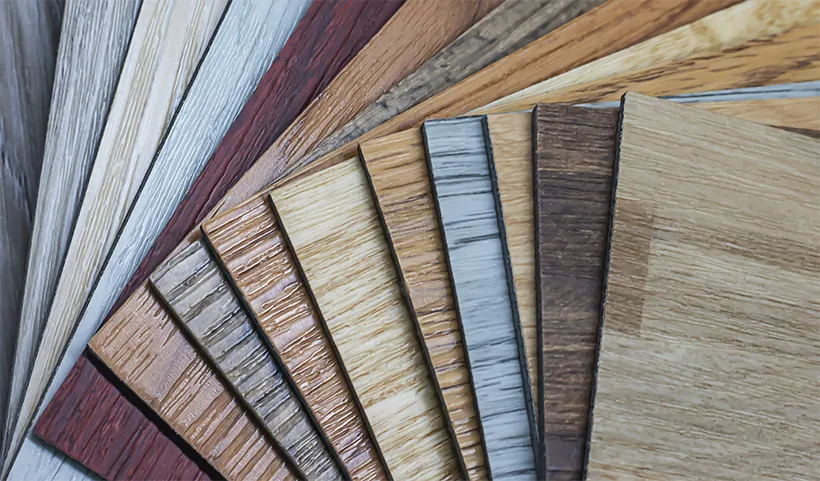

Available in tiles, or for the more affordable option, on a roll. If you’re looking for a stylish option for an area that has gentle to moderate foot traffic and minimal moving of heavy objects, but needs to be easily cleaned, then this option is for you.
PROS
- Available in a broad range of colours and patterns.
- Easy to install.
- Low maintenance.
- Broad range of offering across price ranges.
CONS
- It has a significantly shorter lifespan than wood.
- The adhesive that is used to attached floors contains harmful VOCs.
- Some finishes are more prone to cuts and indentations than others.
RUBBER
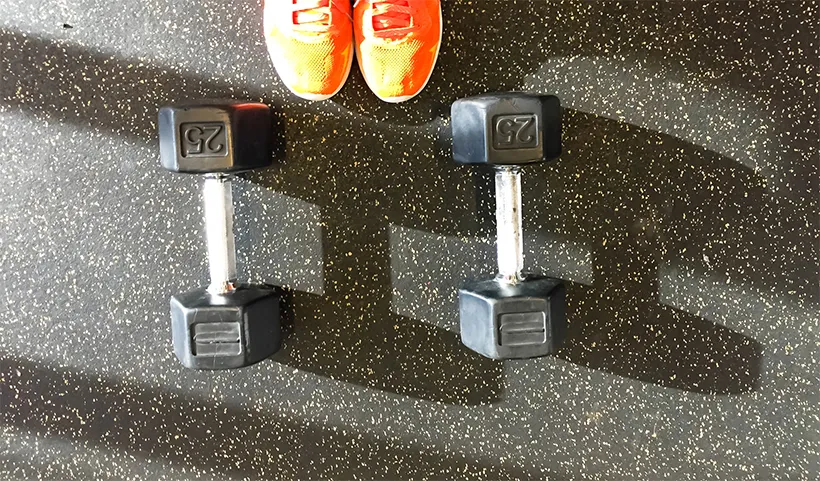

This less conventional option is more often associated with gyms and hospitals, but is increasing in popularity for interior living spaces. Made from either natural tree rubber, synthetic materials or recycled tires, it is most often available in interlocking tiles, for easy installation.
PROS
- As it is nonconductive, it works a great insulator.
- Antimicrobial and hypoallergenic as well as bacteria-resistant.
- Highly durable and easy to maintain.
- Easy Installation.
- Sound absorbing.
CONS
- Smooth tiles can be slippery when wet
- floor might not appear even, due to the interlocking tile system.
- Initial strong rubber odour.
- Premium products tend to be costly.
Luckily BUCO can keep you walking in style with a wide variety of flooring options for your home. Not sure which floor can do more for your home? Come and chat to our in-store experts, we’ve got you covered.

